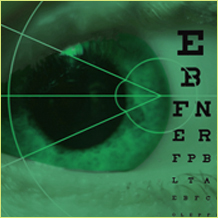Answer
b. False. About 8 percent of men in the United States are color blind compared to 0.5 percent of women.
If you're over 40 and finding it hard to read without holding the page farther away from your eyes, you most likely have what eye condition?
a. Myopia
b. Presbyopia
c. Astigmatism
d. Hyperopia
b. Presbyopia
c. Astigmatism
d. Hyperopia
Answer
b. Presbyopia usually begins in your early 40s and eventually affects virtually everyone to some degree. As you age, the lens, which normally changes shape to focus incoming light from objects, eventually gets rigid. This makes it impossible to see clearly up close.
Approximately how many Americans need some type of corrective lenses (either glasses or contact lenses)?
a. 78 million
b. 112 million
c. 150 million
d. 185 million
b. 112 million
c. 150 million
d. 185 million
Answer
c. More than 150 million Americans wear glasses or contact lenses.
What is the leading cause of blindness in adults aged 20-74 in the United States?
a. Age-related macular degeneration
b. Eye injuries
c. Glaucoma
d. Diabetic retinopathy
b. Eye injuries
c. Glaucoma
d. Diabetic retinopathy
Answer
d. One in four Americans has diabetes, and at least half of them will develop some degree of diabetic retinopathy. Diabetic retinopathy is caused by changes in the blood vessels of the retina that, if not treated, can lead to vision loss or blindness. There are usually no warning signs in the early stages, which is why it's important to get yearly eye exams. Controlling blood sugar levels can reduce the risk of developing diabetic retinopathy.
The most commonly performed surgical eye procedure corrects which vision problem?
a. Corneal disease
b. Cataracts
c. Glaucoma
d. Strabismus
b. Cataracts
c. Glaucoma
d. Strabismus
Answer
b. Cataracts affect nearly 22 million Americans aged 40 and older. Cataract surgery, which involves removing the clouded lens and replacing it with an artificial intraocular lens implant, has a proven track record for restoring vision.
True or false? Eating carrots is good for your eyesight.
a. True
b. False
b. False
Answer
a. True. Eating carrots and other foods high in beta carotene (which is converted to vitamin A)—such as other orange fruits and vegetables and dark, leafy green vegetables—are essential for maintaining good eye health. However, eating carrots can't actually improve your vision.





